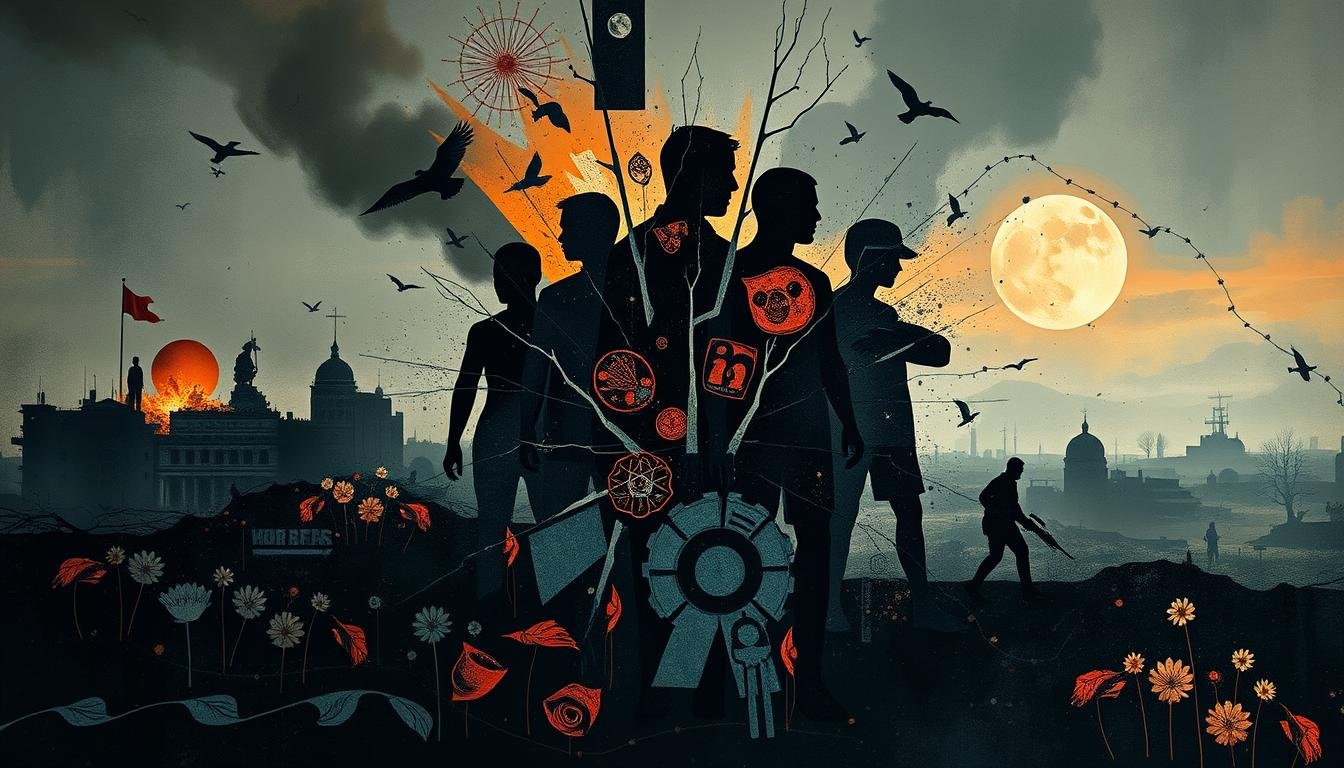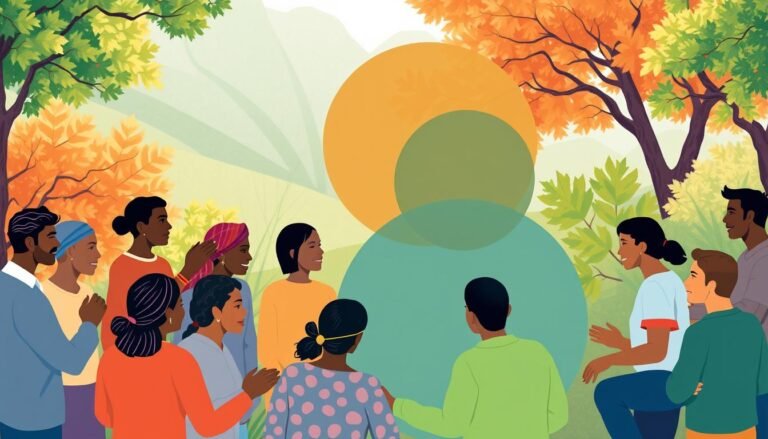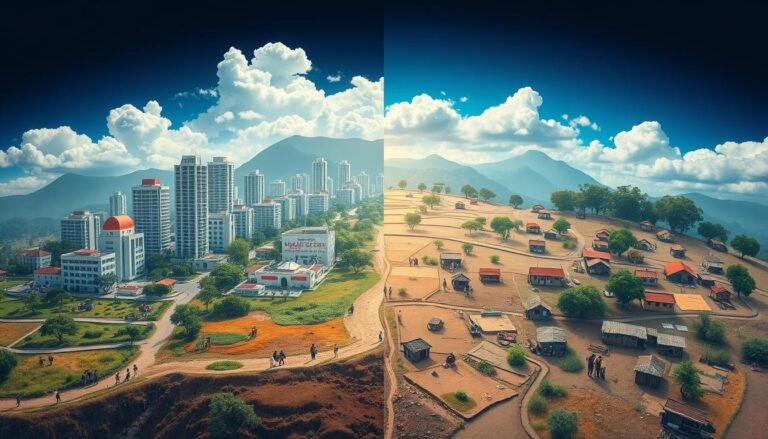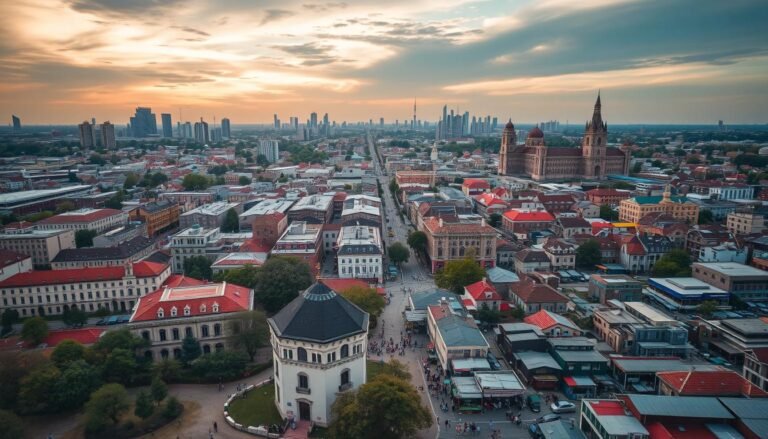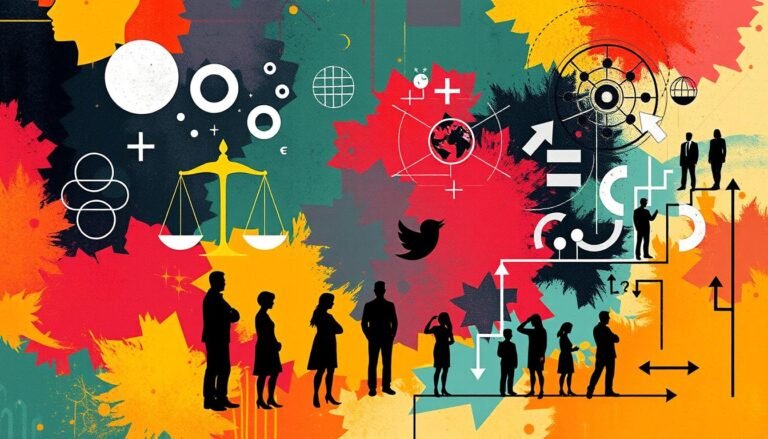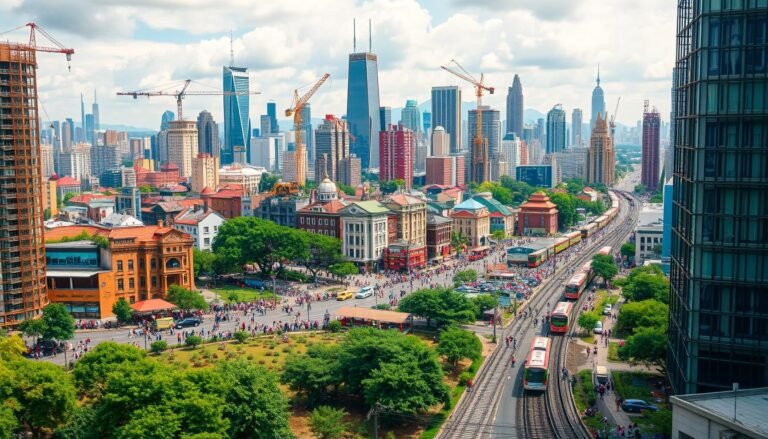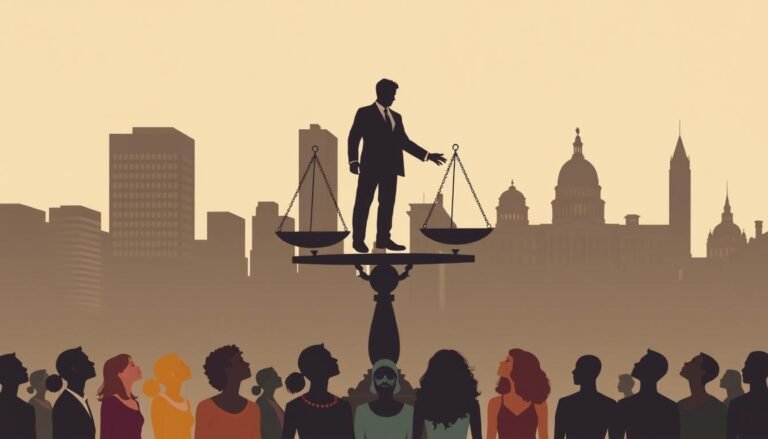The Impact of War on Society: A Sociological Perspective
Can war lead to positive social change? This might seem odd, but it’s a key topic in sociology. Sociologists look into how war affects our social systems, economies, and technology in big ways.
They use different views to study war’s social effects. Some see war as important for society, while others question the high spending on the military. These views help us grasp how war and society are connected.
The term ‘genocide’ was coined by Raphael Lemkin in 1944. It shows the worst side of war, where groups are targeted for destruction. This makes us think about war’s effects on society and human rights.
War has also pushed technology and the economy forward. The internet, now a big part of our lives, started from military research. These examples show how war can have both good and bad effects on society.
Key Takeaways
- War affects society more than just the fighting, changing social structures and economies.
- Different views in sociology help us understand war’s role in society.
- The term ‘genocide’ came from World War II.
- War can lead to new technologies that help civilians.
- Looking at war’s effects on society means seeing its many sides.
Understanding War Through Sociological Lenses
War deeply affects society, changing nations and communities in big ways. Sociologists look at war from different angles to see how it changes society.
Functionalist Perspective
Functionalists believe war has a purpose for society. They think conflicts can bring people together and solve international problems. For example, after 9/11, America felt more united. This idea shows how war can change social ties.
Conflict Theory Approach
Conflict theorists focus on power and inequality made worse by war. They point out the problems with the military-industrial complex. With over 45 deadly conflicts, this view sheds light on economic and social gaps that lead to and come from these conflicts.
Symbolic Interactionist View
Symbolic interactionists study how symbols and views shape public opinion on war. They look at how media and cultural stories affect how we see conflicts. This view is key in understanding how war affects communities, especially with today’s information warfare.
Each view gives us different insights into war’s big effects on society. From bringing people together to widening gaps, these views help us see the many sides of war’s impact.
The Social Function of War: Robert E. Park’s Analysis
Robert E. Park was a key figure in the Chicago School of sociology. In his 1941 essay, he looked at how war affects society. He showed how military conflicts change social structures.
Park saw war as having several important roles in society. He thought wars help solve international problems, bring people together in a country, and help create nation-states. Even though wars are very harmful, Park believed they had a positive impact on society in the past.
At the Chicago School of Sociology, Park taught from 1914 to 1933. This school focused on using data and detailed studies to understand city life. This view helped shape Park’s ideas on how wars affect society.
“War, despite its horrors, has historically served useful purposes for society.” – Robert E. Park
Park’s views on war fit with the big ideas of his time. In the 1940s, American sociology moved from focusing on fixing problems to thinking deeply about theories. This change helped Park explore how wars impact society.
| Social Functions of War | Description |
|---|---|
| Dispute Resolution | War as a means to settle international conflicts |
| Social Bonding | Increased unity within warring societies |
| Nation-State Development | War’s role in shaping national identities |
Park’s work still shapes how we see the link between war and society. His ideas about the social effects of war are still important today. They help us understand how military conflicts change our world.
War and Social Solidarity: The External Conflict/Internal Cohesion Process
War often brings unexpected changes to society. It shows how armed conflicts can make social bonds stronger within communities. This process highlights the deep effects of war on society and its impact on community mental health.
Case Study: Post-9/11 American Unity
The September 11 attacks in 2001 deeply affected American society. After the event, the nation felt more united and together. This shows how threats from outside can bring people closer together.
| Indicator | Pre-9/11 | Post-9/11 |
|---|---|---|
| Trust in Government | 30% | 64% |
| Patriotic Display | 45% | 82% |
| Community Involvement | 38% | 57% |
Patriotism and Shared Purpose During Wartime
War often makes people more patriotic. Citizens come together, sharing values and goals. This unity can make communities more cohesive and cooperative.
War’s impact on communities is complex. While it brings challenges, it can also build resilience and unity. Understanding these effects is key to dealing with war’s long-term impact on society.
The Role of War in Nation-State Formation
War has been key in shaping the modern nation-state. It changes societies and shapes national identities. These changes have helped form and evolve nations into what we know today.
Throughout history, wars have brought different groups together into bigger political units. This helped create nation-states and pushed forward science, culture, and politics. The U.S. Department of Defense Strategic Multilayer Assessment program shows how war can make a nation feel more united by boosting its status against rivals.
War’s impact on forming nations is clear in history. For example, Serbia’s wins in the Balkan Wars made it more respected and boosted its idea of a Serb-led Yugoslavia. This change in identity was part of why Austria-Hungary went to war in 1914, starting World War I.
“War can induce national identification by increasing a nation’s status relative to rivals, which in turn could encourage investments in state capacity and reduce the costs of domestic conflict.”
War and nation-building are closely linked. Winning wars can make a nation feel more united, while losing can make it feel weaker. This has shaped how nations have developed over time, affecting everything from their policies to how they relate to other countries.
| War Outcome | Effect on National Identity | Impact on State-Building |
|---|---|---|
| Victory | Strengthened | Increased investment in state capacity |
| Defeat | Weakened | Potential decrease in state power |
| Stalemate | Variable | Depends on perception and narrative |
Today, the impact of war on forming nations is still important. As we face new types of warfare, like information warfare, how nations see themselves and build their states is changing. This affects global politics and how countries relate to each other.
Economic Implications of War on Society
War deeply affects societies, changing job markets, economic growth, and industrial development. Wars bring both chances and challenges for nations in conflict.
Job Creation and Career Advancement
Wars create more jobs in the military and defense areas. During World War II, the U.S. saw a big increase in jobs, especially for groups often overlooked. This change had a lasting impact on who worked and their career paths.
Stimulation of the Economy
Military spending can make the economy grow. In the 1950s and 1960s, the U.S. involvement in Korea, Vietnam, and Cambodia led to fast economic growth. But, the effects of war on the economy are not always good.
The Military-Industrial Complex
The military-industrial complex shows how a country’s military, defense industry, and leaders work together. This system can lead to new technologies but also worries about defense contractors’ impact on foreign policy.
| War | Economic Impact | Social Consequences |
|---|---|---|
| World War II | UK national debt rose to 240% by early 1950s | Shift in workforce demographics |
| Iraq War | Estimated $860 billion opportunity cost by 2009 | Long-term strain on resources |
| Congo Conflict | Cost equaled 29% of GDP | Significant displacement and refugee crisis |
Wars may boost the economy at first, but they often have lasting bad effects. Destruction, loss of people, and more debt are big problems for societies after the fighting stops.
The Impact of War on Society: A Sociological Perspective
War changes society deeply, affecting social structures and how people interact. Looking at war through a sociological lens shows us how armed conflicts link to social institutions. Wars affect not just the battlefield but every part of civilian life.
Wars can lead to big changes in society. For example, after World Wars I and II, women’s rights improved. They got more jobs and the right to vote. This shows how war can change social norms and roles.
War also changes how groups stick together and their culture. In the US after 9/11, people felt more united. This shows how threats from outside can bring people closer together.
“War has been a catalyst for social change throughout history, often accelerating shifts in societal structures and norms.”
Wars have a big impact on mental health. In places like Afghanistan, Bosnia, and Kosovo, more people have mental health issues after the war. This shows the lasting effects of war on society.
| Aspect | Impact of War |
|---|---|
| Social Norms | Reshaping of gender roles and rights |
| National Unity | Increased social cohesion |
| Mental Health | Higher rates of psychiatric symptoms |
| Technological Advancements | Rapid innovation in various fields |
War and Technological Advancements
Wars often lead to big leaps in technology. Military conflicts push innovation in both military and civilian areas. This has led to big changes in our everyday lives.
Military Research and Civilian Applications
Many modern technologies started in military labs. World War II, for example, led to the creation of penicillin, nuclear energy, and computers. The war made scientists focus on practical uses, speeding up tech progress.
These advances changed the world. By the end of the war, millions of penicillin doses were made, saving many lives. The first electronic computer, ENIAC, helped start our digital era.
The Internet: A War-Time Innovation
The Internet is a key war-time innovation. It started as a way for the military to communicate and has changed the world. It shows how war can lead to big changes in society.
| War-Time Innovation | Civilian Application |
|---|---|
| Penicillin | Widespread medical use |
| Nuclear energy | Power generation |
| Computers | Information technology |
| Internet | Global communication |
Wars often cause destruction, but they also lead to new innovations. These innovations, made out of need, keep shaping our world even after the wars end.
The Power Elite: C. Wright Mills’ Critique of the Military-Industrial Complex
C. Wright Mills talked about the power elite and how armed conflicts affect society. He said a small group of people from government, big business, and the military rule society. They do this for their own benefit.
This elite group has a close relationship. It gives the military-industrial complex a lot of power over the economy and foreign policy. Wars’ economic effects are often made by this group. It includes around fifty top decision-makers in the executive branch.
Mills believed power in America has changed over time through five main stages. Now, political, economic, and military powers are very connected. This means society works differently and resources are used in certain ways.
“The power elite is composed of men whose positions enable them to transcend the ordinary environments of ordinary men and women; they are in positions to make decisions having major consequences.”
Studies back Mills’ ideas show that 65% of America’s richest people are in family businesses or live off investments. This focus of wealth and power makes us wonder about democracy and the effects of wars on society.
The military-industrial complex’s impact isn’t just during wars. It affects technology, jobs, and the economy. Knowing about this power structure helps us understand how wars really change society.
Imperialism and Modern Warfare
Warfare’s effects go far beyond the battlefields, shaping global politics and economies. Modern imperialism, often hidden as military help, affects societies all over the world. Today, over half of people live in cities, a result of military conflicts.
Western powers have used their military and tech to spread their influence. The steamboat, telegraph, and rapid-fire gun gave them an edge in Africa and Asia. This led to more colonies, like Britain in Egypt and Belgium in the Congo. They claimed it was for economic, military, political, and humanitarian reasons.
Now, military operations need to understand local cultures. Africa and the Middle East’s growing populations bring challenges like political and religious extremism. Forces must be ready for long operations in cities, showing how war changes societies today.
“A Short History of War” by Jeremy Black stresses the importance of seeing warfare from a global view. It shows war has always been part of human history, affecting politics, society, and culture. The book suggests moving from a Western focus to understand war’s global impact on societies.
Source Links
- War and Genocide: A Sociological Approach | Sciences Po Violence de masse et Résistance
- No title found
- The War in Ukraine: A Process Sociological Perspective on How We Got Here
- Introduction to April’s theme: War
- LibGuides: Social Work Theories: Conflict Perspective
- Robert E. Park
- 1.0_Introduction
- Microsoft Word – chapter 1 outline.doc
- 16.1 Sociological Perspectives on War and Terrorism
- 16.1 Sociological Perspectives on War and Terrorism
- War: How Conflict Shaped Us
- Economic impact of war – Economics Help
- The economic consequences of war
- The Impact of War on the Social, Economic, and Political Landscape of a Nation
- Social Justice and Sociological Theory
- Mental health consequences of war: a brief review of research findings
- Technology and the Nature of War – Marine Corps Association
- War and Technological Progress
- The Power Elite by C. Wright Mills 1956
- C. Wright Mills, Power Structure Research, and the Failures of Mainstream Political Science
- The Power Elite
- Modern War and Cultural Change
- 551004-ch09.3.indd
- #Reviewing A Short History of War

